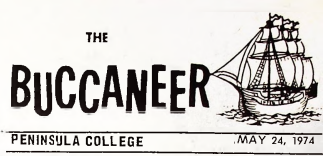
RIF policy tabled
Trustees elect officers, approve art addition
Election of officers, tabling of
the reduction in force policy,
and approval of an addition to
the art building consumed the
Board of Trustees meeting May
15.
Henry V. Charnell Jr. was
again elected chairman of the
board for Community College
District 1. Fred B. Rosmond
will continue as vice chairman,
and President E. John Maier as
secretary.
Early in the meeting
representatives of both the
administration and faculty
negotiating committees gave
progress reports on the
reduction in force policy. While
Dean of Instruction Floyd
Young reported that all sessions
and meetings on the policy had
gone well, Dr. Jack Evans of the
faculty committee reported
“serious reservations” about
several paragraphs within the
most recently negotiated policy,
and said the faculty would need
more time to consider these
items.
Board chairman Charnell
commended both committees
on their cooperation and efforts
and strongly recommended that
the issue come before the board
for final action at the June
meeting.
Bill Coates of the state
attorney general’s office was
present to discuss ramifications
of an “errors and omissions”
insurance policy for the
trustees. He said such
insurance would protect
individual members of the
board from suit due to errors
made while conducting business
of the college district.
Coates said the present
identification statute gave the
best protection, and could not
recommend that the college try
to secure insurance at this time.
Coates believes a unified effort
on the part of all the states’ twoyear schools could eventually
lead to an attractive policy,
with necessary safeguards at a
reasonable price.
In other board action, tenure
was granted to J. Marvin
Pollard, Jerry Spicer and Tom
Wells. Mrs. Sharon Ann Perry
was re-employed to teach two
quarters of pyschology for the
1974-75 school year.
Board member Gerald Hunt
was designated to award
diplomas at the 12th annual
commencement exercises on
June 15.
A college automobile policy,
covering authorized use of the
school’s vehicles was adopted,
and Business Manager Frank
Thayer was designated
transportation officer.
The annual meeting of the
Trustees’ Association for
Community College Education
begins today in Richland, and
board members Charnell,
Gerald Hunt, and “Brick”
Johnson are attending with Mr.
Maier.
The board approved
construction of an addition to
the Art lab north of the
gymnasium. It will house the
crafts lab for sculpture and
pottery. The present crafts
room will revert to its originally
intended use: storage and
music classroom area for the
Little Theatre.
Funds for the addition will
come from the local plant fund.
The addition will be
approximately 3000 square feet.
The budget allocation for
1974-75 was reviewed and a
report on the summer session
given by Mr. Young.
In a discussion on the status of
the tennis court construction,
President Maier indicated the
contractor was “very
concerned” about a low spot on
the proposed site, which is
composed of peat and is prone
to settling. The contractor is
observing the site and
removing the peat in hopes of
stabilizing the ground to allow
construction to continue.
Bauer, Nestorek win ASB service awards
Shelly Bauer and John
Nestorek were chosen as
recipients of the ASB student
services award for 1973-74
during the May 14 BOC
meeting.
The award, to be presented at
commencement, signifies hours
of volunteer labor towards
helping BOC and the student
body in general. This is the first
year the award has been
presented.
In other business, two
upcoming activities were
planned. On May 24, BOC will
present two films, “Girl in My
Soup,” and “Out of Towners” in
the Little Theatre. Price will be
75 cents for students.
A planned fishing contest,
banquet, and outdoor concert
was scrapped in favor of doing
something to brighten up
graduation night. BOC decided
to hire some local and out of
town musicians to present an
informal outdoor concert on the
central plaza after the
graduation ceremonies. The
music will start at 10 p.m. and
continue until midnight.
Sue Spillane reported that
student rates are now in effect
at the Lincoln Theatre for
anyone with a current PC
identification card. Students
must show the card to take
advantage of the price cut; the
ticket taker won’t ask for it.
Two bids have been received
from companies on a new stereo
system for the PUB. The new
system is expected to be
installed and in operation by fall
quarter.
Role of minorities counselor- ‘exciting and painful learning’
By NANCY WHITE
Mrs. Rosa Philby, new
minority affairs advisor for
Peninsula College, would like
Indian students to get involved
— involved in their culture and
themselves.
However, she added, “Not to
separate, but to share.”
“I believe that we all
basically need roots, cultural
and family,” she said. “We
have run into painful situations
where we don’t know where we
fit. I would like to encourage a
healthy awareness — not only
for the Indian students, but the
campus as a whole.”
A native of Honduras, in
Central America, Mrs. Philby
was reared in Los Angeles and
San Diego. She attended the
University of San Diego, where
she studied psychology.
Before coming to Port
Angeles a year ago for “a
change of pace,” Mrs. Philby
said she worked at the
University Mound School, a
home for delinquent girls. She
worked as an aide there,
counseling and observing.
This is Mrs. Philby’s first
work with Indians and says her
first exposure “culturally to the
problem of prejudice and the
stigmas of prejudice.”
“This whole role of minority
counselor is going to be a
learning situation, an exciting
and painful learning situation. I
feel very humble in this area
because I know really very little
about it,” she said.Mrs. Philby is learning
quickly the problems that
Indians have in the community.
She attended the recent
demonstration against
Commissioners Caulkins and
Feeley’s minority comments.
She also was present when the
tape of the meeting was played.
“The thing that made my
stomach turn was to see the
arrogance and sense of justified
complacency coming from the
commissioners,” she said.
Mrs. Philby added: “I would
find it very difficult to be
working for a boss with pretty
prejudicial attitudes. All of us
really need to sincerely look
into our hearts and find out
what is really there. Are we
trying to understand?”
The dark, petite Mrs. Philby
was dressed comfortably in an
orange sweater and black
slacks as she talked about her
job. “My main interest now is
getting acquainted with the
campus and working on
relationships. I can set no goals
until I know where I’m
beginning,” she said.
Mrs. Philby is busy. She must
stop to help a recently divorced
woman fill out a form. A sackful
of Indian craft work sits by her
desk. Students have been
collecting it for her to put on
display in the library case. She
also is working on getting local
Indian dancers on campus June
7.
Her mother migrated to
California because of a better
job situation. Mrs. Philby feels
it was “only the will of God”
which enabled her to work as a
seamstress to bring her
children over.
“It is my faith that keeps me
going,” she said. “It is the core
of my existence. Man’s
struggles to arrive at perfect
Utopia are futile. He can’t do it
solely of himself.”
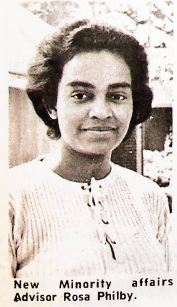
Fryer takes ASB president race
Peninsula College will have a
nearly all male student
government next year,
according to results of the ASB
elections.
Tim Fryer was elected
president, Jeff Pope, vice
president; Kathy Feakes,
“There was no real concern to
take positive action or no real or
sincere concern about future
positive action.”
and will go into effect fall
quarter.
According to James Lunt,
director of student activities,
the only close race was between
Shelly Bauer and Jeff Pope for
vice president. Final tally
showed a margin of 13 votes
between them.
Official count of total votes
cast was 208 out of 702 eligible
voters, or nearly 30 per cent.

Editorial
Make P.E. elective
A Peninsula College student was almost denied his
Associate of Arts Degree because of a missed P.E.
credit. He has well over 90 credits in other areas but
was unable to complete his third P.E. class due to an
injury.
It is absurd to think there is even a possibility of this
happening. P.E. requirements for graduation should
be dropped.
THE
BuCCANEE
Published bi-weekly by journalism students of
Peninsula College’, Port Angeles, Wash. 98362
Editor Rich Olson
Reporters…………………. Bfl Coppo, Ed Mund, Nancy White
Photographers…………………………………Tom Cole, Neal Ruud
Advisor…………………………………………………………. Earl Clark
Letters to the editor are welcome and sho. Id be
submitted to the Buccaneer workroom FA 25. Letters
should be 250 words or less, must be signed and include the
name and address. Name will be withheld upon request. All
letters are subject to editing as to content and length.
Physical fitness is fine, but an individual should be
allowed to do what he wants with his own body. It is his
own business if he wants it to go to pot. P.E. credits
should be totally elective. Many students have neither
the time nor the need for it. It is time for us to take
care of ourselves.
Many colleges have dropped P.E. requirements.
Peninsula College should follow. We who are less
physically coordinated shouldn’t be subjected to the
stares of others as we fall on our faces.
— Nancy White
Students rate lectures in Studium Generale
In the third quarter of the
Studium Generale lecture
series, students were invited to
rate each program as excellent,
good, fair, or poor.
Although Dr. F. A. Siegler,
University of Washington
philosophy professor, received
an unusually high number of 64
non-responses on the returned
sheets, no other presentation
stunned the audience into more
non-votes than checks by
excellent or good rating.
Top scores for excellence
went to Dr. and Mrs. John
Siemens for last week’s
illustrated travel guide on the
South Sea Islands, Mr. Larry
Bourne on “Underwater Sealife
Photography,” and Western
Washington State College’s
comic operas, all of these had
over 100 excellent and good
ratings combined, from 172
enrolled students.
Poorest ratings were given
Dr. Siegler on “India — 1973:
Introduction to Past and
Present Philosophy”; and Dr.
Robert Keller from Fairhaven
College at Western Washington
on “The Role of Initiatives in
Politics.”
Combining fair, poor, and
non-responses gave 97 and 93
disappointed students.
Hodge poetry reading next to last in series
Margaret Hodge from the
University of Washington read
her own poetry May 21 in the
Little Theater.
Hodge was one of two poetsin-residence in Seattle Public
Schools last spring on a grant
from Seattle’s Art Commission.
She also has taught poetry
workshops at the university in a
non-credit continuing education
program.
Her poetry has been
published in more than 30
magazines and anthologies here
and in Canada, including
poetry, The Nation, and Prism
International.
Ed Tisch will do the next
reading May 28, with poems
about the Northwest.
He will select poetry from the
book “Five Poets of the Pacific
Northwest.” The poets are
Kenneth G. Hanson, Richard
Hugo, Carolyn Kizer, William
Stafford and David Wagoner.
Mr. Tisch may show some of
his own 35 millimeter slides of
theNorthwest to accompany his
reading.
Library corner

The library has acquired two
new magazines:
Car and Driver is one of the
best automotive magazines in
America. Written for foreign
car and high performance
American car enthusiasts, it is
generally anti-Detroit in tone,
and editorials show interest in
promoting car racing into a
major league sport. Results of
their own road tests are
reported in detail. Special
monthly departments give
information on new cars and
related products, short, belated,
detailed results of races, and
racing calendar listing
important worldwide events.
Ails of Asia is a beautifully
illustrated magazine published
in Hong Kong that will be of
special interest to ceramic and
art students. This magazine
features private collections just
now emerging in the Chinese art
scene. Its reproductions in full
color are superb, and it is ideal
for browsing.
A final reminder to students:
all books, periodicals, and other
materials must be returned to
the library before grades and
transcripts will be issued.
Rebutal
An editorial in the April 12
Buccaneer suggesting that
Peninsula College students
should be allowed to select their
graduation speaker included
this comment:
“We don’t want to imply we
dislike this year’s selection,
State Sen. Gordon Sandison,
though we are unsure that all of
us agree that he has done (or
the legislature as a whole) all it
can to ‘help’ community
colleges.”
President John Maier has
asked rebuttal space to reprint
the following article by Jim
Kneeland in the Jan. 1
University (of Washington)
Daily, headed: “Sen. Sandison:
More important than he
seems”:
The name “Gordon
Sandison” is not what could be
called a household word
throughout the state of
Washington. After all, why
should the owner of an
insurance agency in remote
Port Angeles be known
throughout the state?
There are two answers to that
Joint
Higher
same
as the
of the
on
This
serves
question:
— For the last 25 years he has
played an important role in
spending a sizeable portion of
Washington’s tax revenue.
— He is the man who has
guided higher education in
Washington to what it is today.
Senator Gordon Sandison is
Chairman
Committee
Education.
committee
education sub-committee for
the appropriations committee.
If he had the desire, he could
dictate nearly everything that
happens in higher education in
Washington state. He doesn’t
operate that way, however.
Over the last 25 years,
Sandison has pioneered in many
areas of higher education. He
sponsored and fought for the bill
to establish community
colleges. He led the fight to
establish vocational training
programs and was sponsor of
the bill creating The Evergreen
State College.
Currently the emphasis
Sandison sees is not on
pioneering but rather on trying
to survive the energy crisis.
“All of a sudden economics and
Washington’sshare of the gross
national product are going to be
very important to higher
education,” he says.
Sandison sees the cost of
education to the individual
student as being on the rise.
“You have the Carnegie report
and they say that students
should pay half of the cost of
their education which would be
considerably more than we are
paying now. We feel now that
tuition takes care of about a
third of the cost of education ”
Sandison said.
Sandison also tells of a plan
whereby the student would pay
back the state, either in money
or in service, after college
suggesting it as a new
philosophy that is attracting
some interest. 6
Commenting on the current
stiuggles on the University of
Washington Campus between
classified staff “
adminiStration over
reclassification, Sandison says
” I Think understanding is
needed more than legislation ”I believe very strongly that our founding fathers knew pretty well what they were
doing when they said there
should be legislative, judicial,
and administrative branches . .
. we are not a policy-making
body. We are a body of laws.”
Sandison may not make
policy, but he has definite views
about education. At times he
becomes impatient with the
slow process of change in higher
education.
“I am impatient because
higher education becomes kind
of a stiff and inflexible,
horizontal corporation that does
not yield as readily to change
and changing needs of society
and students. But again, as I
look to other states and
campuses, I find we do better
than most,” Sandison explains.
He sums up the matter by
stating “If the University
community can’t sit down and
work this out in a conversational way, then I think we are
probably in deep trouble in this
country.”
The area of tenure is one of
interest for Sandison. Now that
the baby boom of the 50 s is
apparently over and
universities and colleges are
facing decreasing enrollment,
the question of which members
of the faculty will stay and
which will be forced to leave is a
complicated issue.
“My feeling is that the
criteria you should use (on
retaining faculty) should be
student demand.”
When you look at Gordon
Sandison and his office, which
even has a genuine politician’s
leather couch, you immediately
capture an image of the
stereotyped politician — the
smoke-filled-room-man who is
one of the boys. He is a
politician, but the special
interest that hasthe armlock on
him is not something sinister,
like a large corporation seeking
political favor. It is the desire to
see that every resident of
Washington receives an
excellent education.
Sellers and Lemmon in tonight’s films
The films “The Out-ofTowners” and “There’s a Girl
in my Soup” will be shown
tonight at 7:30 in the Little
Theatre.
“The Out-of-Towners” stars
Jack Lemmon and Sandy
Dennis.
“There;s a Girl in my Soup”
stars Peter Sellers and Goldie
Hawn.
Admission price is 75 cents.
Campus Briefs
Residents of Stimson Hall at
WSU celebrated the eighth day
of May according to tradition by
throwing nearly 200 women into
the Stimson Hall fountain and
pool. This more than betters
last year’s record of 92.
Fall registration
Returning students are
getting first choice at summer
and fall quarter classes by
signing up for registration
appointments now.
Students will register June 17
for summer quarter. Classes
will start the next day.
Registration for fall quarter
win be Sept. 17, 18, 19 and 20.
Classes will start Sept. 23.
Registration will be in the
PUB and will follow past
procedures.
‘Reefer Madness’ – mixed reaction
By BLL COPPO
Open your eyes and prepare
yourself for a shock!
A harmless puff may make
you a killer. Kill this menacing
scourge. Delinquent youth gone
berserk with “reefer madness.”
Deadlier than the most
dangerous criminal, Public
Enemy No. 1 — the living death.
The quagmire that drags
women down.
Of course this film was called
“Reefer Madness.” It was
shown Saturday night in the
Little Theater. Audience
reaction to the film was mixed,
either funny or not funny at all.
Most of the reaction was that
the film was out of proportion
and was mainly a scare tactic
back in the ’30’s to show what
‘grass” can do to you.
The second film that evening
was the Martian Space Party.
Reaction was: “it could have
been.”
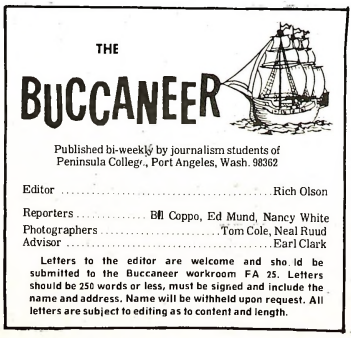
Pirate golfers look strong
Peninsula College is the only
community college to go
without a golf team. After one
season of practice, which would
have finished high in the
Coastal League, PC will be in
the league next season.
Members of this year’s team
included top seed Rob
Bramlette, Terry McDonald,
John Thronson, Tim Fryer and
Jim Powers. The team was
coached by Don Huston. Mr.
Huston says Thronson,
McDonald, and Fryer will be
back next year with a recruit
from Mollala, Ore., a four
handicapper named Rob
Gibbons.
PC won all matches played
except a tie against league
winner Clark and a loss to
Bellevue. PC played five
matches against six teams.
John Ralston honored as IM athlete of year
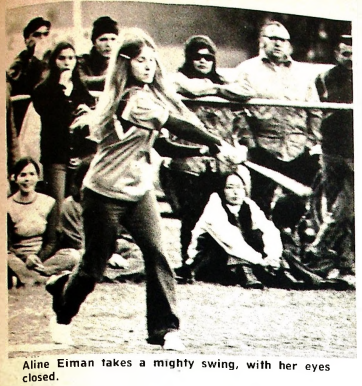
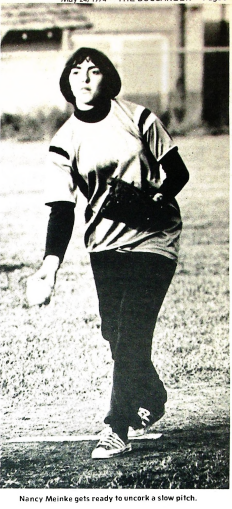
John Ralston, son of Mr. and
Mrs. Marcus Ralston of Port
Angeles, has been selected by
the intramural board as
Intramural Athlete of the Year.
According to P.E. instructor
Jon Livingston, “No one has
come close to doing what he has
done. He outdistanced all the
others.”
John was on the winning team
in basketball, volleyball,
doubles badminton, and last
year’s softball team. He placed
second in the basketball freethrow contest, and in bowling.
“John has shown active
interest in all of our programs.
He has entered every
intramural event except
chess,” Mr. Livingston said.
Livingston said John is so
controversial because he
“knows the rules as well as
plays by them. He always
displayed good
sportsmanship.”
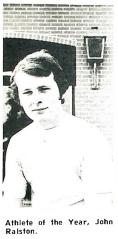
Lost red. gear sought
Anyone knowing the
whereabouts of a PC one man
tent and pair of snowshoes is
urged to call Tom Phipps at 457-8437 He left them in the care of
a girl in the gym about three
months ago. He cannot
remember who the girl was,
and that was the last time he
saw the equipment.
If he cannot find the
equipment, he will have to pay
the school $125. He said this
would be financially disastrous
for him.
In anyone has any
information leading to the
recovery of this equipment,
please call Tom. He offers a
reward.

the Port Angeles slowpitch
league lines up, from left:
Deanetta Medley, Vicki
Charles, Julie Peters, Lorna
Charles, Nancy Lingvahl,
Sharon Boddy, Cindy
Money, Shelley Davidson,
(captain) Nancy Meinke,
Vicki Samples, Kathy
Feekes, and Coach Don
Estes. Kneeling in front are
Aline Eiman and Brenda
Williams.
165 will recieve diplomas at commencement June 15
The following students will
receive an Associate of Arts
Degree from Peninsula College
on June 15:
Linda Elizabeth Alder,
Deborah Jean Anderson, Gary
Dean Arnold, Robert Norman
Brooks, Daniel Arthur
Brouillard, Kenneth Mitchell
Buckner, Linda Susan Button,
Matthew Shannon Blore,
Stephen Bruce Chamberlain,
Nikki Jeanne Clayton, John
Cameron Coleman, Daniel
Thomas Collins, Edward Allen
Coppin, William Robert Coppo,
Bruce Michael Cox, Susan Joy
Curren,
Shelley Jean Davidson, Guy
Franklin Doss, Phyllis Liz
Edmisten, Darlene
Edwards, Daniel Lawrence
Estes, William John Evenstad,
Roger Eugene Fasola, Theresa
Michelle Foley,
Larry George Germeau,
Cheryl Ann Goin, Lloyd Charles
Goodrich, Ida Kristine Halko,
Abdulmohsin Salih Haidar,
Lester Oakes Hall Jr., Michael
Dean Haller, John Spencer
Hart, Cathy Irene Hassel, Alan
Wayne Hawley, Vickie Sue
Heckman, Troy Marvin
Herridge, Mary Lou Hostetler,
Mary Christine Hudon, Lynette
Ann Huffman,
Jean Marie Iverson, Jennifer
Reed Jackson, Amy Gail
Jenkins, Carla Sue Jachau,
Mabel I. Justin, Diara Lynn,
Kirner, Sharon Rae Kish,
Michael Leon Kitz, Lisa
Michele, Kochanek, Robert
Arthur Krutenat,
John Edward Lange, Kenneth
Earl Lessard, Mary Catherine
Liegel, Mark Raynard Lingen,
Nancy Kay Lingvail, James
Dana Lotzgesell, Melva Gay
Lund,
James Andrew McGee,
Thomas William McLane,
Norman Scott McLain, Guy Lee
Madison, Christina Helen
Maier, Scott Alan Marriott,
Heidi Lyn Mayberg, Ronald
Curtis Maynock, John
Elkannah Mead, Nancy Joyce
Meinke, William Henry Mercer
Jr., Pati Lynn Merrick, John
Joseph Miletich, Mary Ann Mix,
Judith Patricia Moilanen,
Karen Ann Monds, Diana Lynn
Morris.
Robin Denise Nelson, Richard
Winfield Olson Jr., Susi Karlene
Ostlund, Milton Everett Pagel,
Denise Adele Parrish, Cherisse
Joyce Pazan, Julie Dell Peters,
Dorothy Jean Phillips, Karen
Lynn Piazza, Charles Dickinson
Piercy, Richard Glenn Platt,
Jennie Lou Priest,
Lance Clayton Rennie, Vic
Omer Richardson, Debora
Catherine Richert, Louis Victor
Roberts, Mary Christina
Roblan, Richard Wade
Roebuck, Charles Arthur
Rondeau, Robert Walter
Rupert,
Rikk Jeremy Schlaffman,
Rob Max Schoenfeld, Mary
Louise Sears, Jack Donald
Seibert, Karen Elizabeth
Seibert, Kathy Louise Seibert,
Gloria Ann Shinn, Susan Joy
Spillane, Kristina Margaret
Stephens, Karl Louis Stokke,
Nancy Lou Taylor, Debbie Lee
Thompsen, Catherine Edith
Tickner, Shellie Fae Timmen,
Joseph Leo Tschimperle,
Constance C. Van Horn,
Sharon Hobbs Van Horn,
Gordon Alan Vickrey, Martin
Richard Weinrick, Terry Jon
Westfall, Donald Allison
Wildman, and Carolyn Marie
Woodside.
The following students will
receive an Associate of Applied
Arts Degree from Peninsula
College:
Jeffrey Lorin Akins, Donna
Leigh Anderson, Stephen
Sutherland Axtell, Vernon
Wayne Bessey, Bruce Edward
Berry, Neal Mark Brodien,
Clifford Barton Brown, Gary
Michael Bukowski, Patrick
Vernon Burclick, Rhonda Ann
Carrell, Virgil Thomas Cole Jr.
Leo James DeGraw, Leonard
Allen Broderson, Aline Marie
Eiman, Ronald Vern Evans,
John Arthur Farmer, Gary
Gayton Francis, Harold A.
French.
James Everett Garrett,
James Roy Gau, Charles Wayne
Gloger, James Lee Grant,
Daniel Thomas Hall, Ronald
Eugene Haller, Charles Owen
Hamstreet, Karla Marie
Hibbard, John Charles Holmes,
Tim Holth,
Richard Allen Johnson,
Sandra Jean Johnson, William
Gerald Johnson, Betty Jane
Kerrigan, Marilou Marsha
Kirsch, William James Koepke,
Daniel Jerome Kolden,
Charles Kowalkowski,
Howard Kriener.
The lecture covered
understanding behavior and
human relationships and the
nurse-patient relationships.
Olson also talked on sources of
behavior and how to respond to
problem patients.
Olson, who holds a master’s
degree in psychology, urged the
students to show interest and
concern for a patient. “If you
listen carefully, you can sense
his feelings,” she said.
“Advice is seldom listened to
and seldom followed,” she said.
A nurse shouldn’t give advice,
but instead, “help his problem
solve itself.”
Olson said that if we show
interest in others, “It says I
care about you.”
David Carl Leaf,
Bruce Lutz, Nicholas
Mickel, William Takeo Lile,
Thomas G. Middleton, Robert
Anthony Munday, John Edward
Nestorek, Gregory Keith
Owens, Carl Michael Pangratz,
Alfred Scott Pavlak, Frank
Russell Phillips, Lloyd Moore
Phipps, Monty Russell Platz.
Stephen Allen Reno, Deanna
Grace Robbins, Jeremy John
Rosen, Ronald Emil Sacco,
Vicky Lynn Samples, William
Bert Seelye, Ruth E. Seelye,
Jeffery Alan Seifert, Daniel
Scott Sinnes, Edward Nicholas
Small Jr., Timothy Joel Smith,
Wilfred Ambrose Sommers Jr.,
Christine Marie Stanley,
Marilyn Ruth Still, Randall
Edward Stone,
Jack Lee Titterness, Daniel
Clifford Tweter, Gordon
Wallace Umbehocker, Gary A.
Wall, William Don Wammock,
John Brady Warder Jr., Boyd
Lynn Wells, Robert Douglas
Wells, and Victor J.
Wiedersberg.
Talk on Marshall Islands given by Dr. Siemens
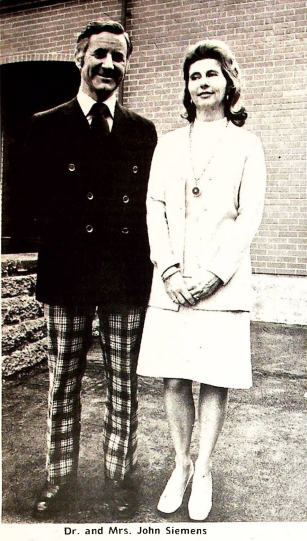
Dr. and Mrs. John Siemens of
Port Angeles gave a lecture on
the Marshall Island Trust
Territory at Thursday’s
Studium Generale. Dr. Siemens
practiced medicine in an
American hospital on the island
of Kwajalein.
Kwajalein is the government
seat in the U.S. Trust Territory.
It is an island one-half mile by
three miles long and is at the
southern end of the world’s
largest atoll.
The doctor showed a picture
tour of Kwajalein and its
neighboring islands, with a
group of high schoolers. The
trip went through the islands in
the atoll and came to rest on the
island of Ponape.
On the isle of Ron-Rong, their
group stayed at the church-run
high school where students
come from all over the islands.
The students in the high school
live in dormitories with 175 girls
in one dorm, which is padlocked
each night at 6 p.m.
The Siemens’ slides showed
beautiful green islands,
colorfully dressed natives,
sunsets, and monuments to the
Japanese and the Americans.
The also explained some of
the local history of the atoll.
Colonized by Spain, Germany
ruled until World War I, then
the Japanese took over. The
U.S. gained control after World
War II. Bicycles and canoes are
the main transportation.
Natives sleep in their huts but
live outside. A hut is shared by
many relatives and their
families. Asked how conception
came about, the doctor said the
husband would take his wife out
in his boat or into the field
(sounds familiar). The rule of
the atoll is a kingship run by a
male, but women rule and use
the men as sex partners.
The native islands around
Kwajalein are becoming
Americanized. On the island of
Ponape, the women go topless
but are starting to wear bras.
On Sunday, the women wear
bras because itmakes them feel
dressed-up. Kissing is just
beginning to catch on with the young people.
PC choir appears with PA Symphony and Choir
Tuesday mgm, iviay 14, J.
Marvin Pollard directed the PC
Choir and Community Choir,
with the Port Angeles
Symphony directed by Dr.
David Andre in its last seasonal
concert, at the high school
auditorium.
On Friday the college Choir
attended the annual Community
College Choir Clinic at Olympic
College in Bremerton. Students
who attended this session were:
Donna Anderson, Lynette
Anderson, Lois Blair, Sharon
Bravo, Cathy Clevenger
Melanie Collins, Diana
Dickinson, Ida Halko, Cleo Hill,
Aline Eiman, Marcella Gagner,
Gladys Gallagher, Valerie
Haldersen, Bill Hebert, Betty
Kerrigan, Phil Longstreth,
Cathy Main, Margerie Millo,
Ron Maynock, Steve Norris,
Dana Roberts, Rodney
Rodgers, Kate Silves, Jamie
Spence, Charity Strand, Andy
Toothman, Annette Van Der
Wall, Paula Watson and Dale
Williams.
There were 14 community
colleges at the clinic.
Linda Olson featured in nursing workshop
“Do unto others as they would
have done unto them.”
This altered “Golden Rule”
was stressed by Linda Olson,
assistant professor, Pacific
Lutheran University, at a
nursing workshop May 17 in the
lecture hall.
Olson talked on “Toward
More Effective Relationships
with Problem Patients” in two
three-hour sessions which were
open to the public.
Following her lecture and a
coffee break, the students
viewed the film, “Mrs.
Reynolds Needs a Nurse.” A
group discussion was then held
on problem patients, discussing
whether theory can be applied
to real situations.
The lecture covered
understanding behavior and
human relationships and the
nurse-patient relationships.
Olson also talked on sources of
behavior and how to respond to
problem patients.
Olson, who holds a master’s
degree in psychology, urged the
students to show interest and
concern for a patient. “If you
listen carefully, you can sense
his feelings,” she said.
“Advice is seldom listened to
and seldom followed,” she said.
A nurse shouldn’t give advice,
but instead, “help his problem
solve itself.”
Olson said that if we show
interest in others, “It says I
care about you.”

